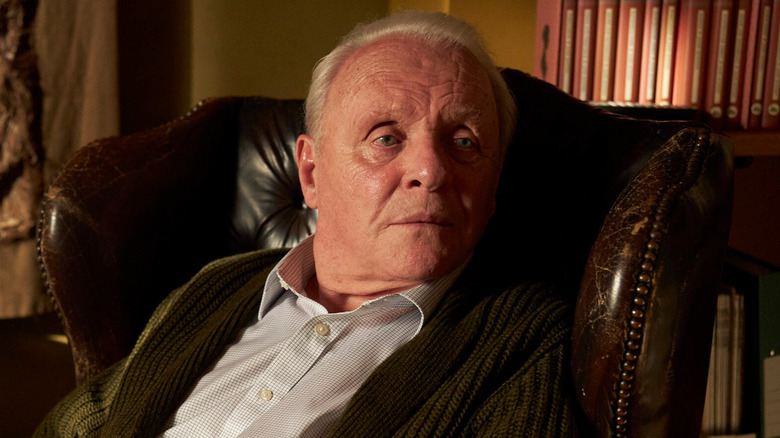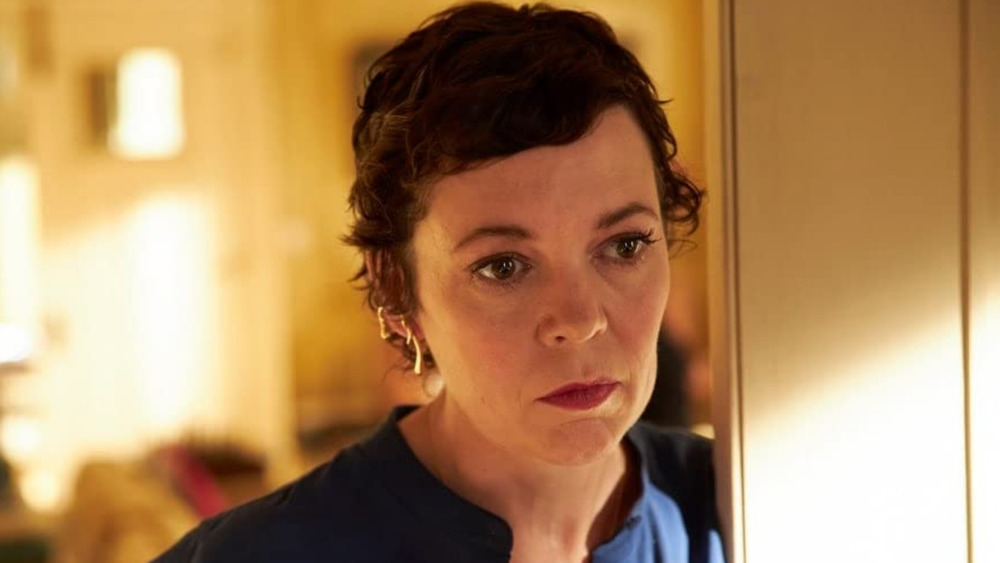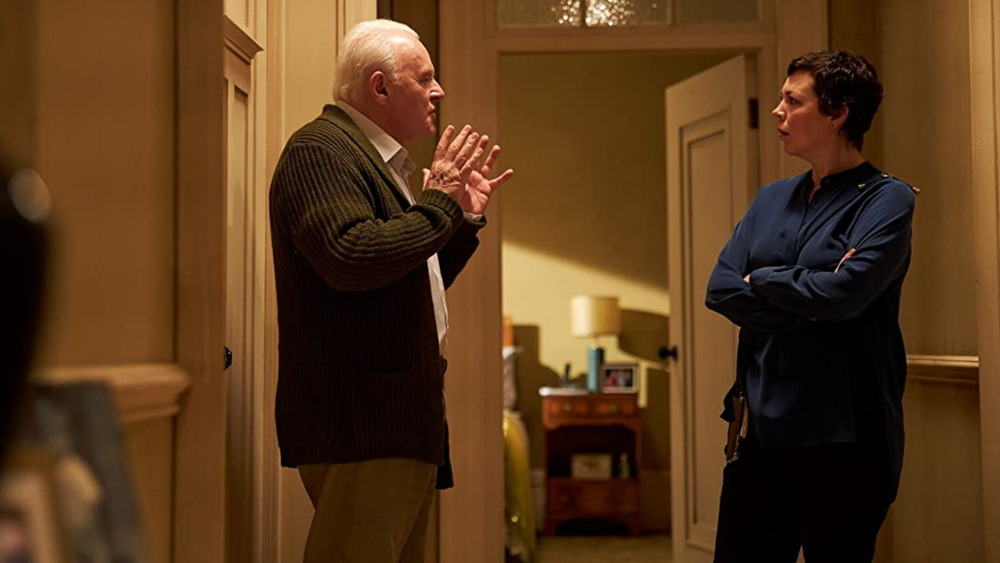The Father Review: Anthony Hopkins Is Outstanding
A startling, powerful portrayal of dementia and the shifting dynamic as child becomes caregiver to a parent, The Father achieves exactly what it sets out to do. Centered around a masterful performance from Anthony Hopkins and a discomfiting design aesthetic, the result is an eye-opening film that should be experienced by anyone with a loved one in the autumn years of life — or who hopes to understand their struggle.
Hopkins is in nearly every scene as Anthony, a charismatic former engineer with a mischievous streak. Early in the film, the audience learns that while he has lived alone and independently for many years, that window of time in the 80-year-old's life is coming to a close. He has become increasingly dependent on his daughter Anne (Olivia Colman from The Crown), and she is feeling overwhelmed not only by the grief that accompanies her father's diminishing memory, but also his tendency to scare away the caregivers she has attempted to hire.
Also in the mix is a solid supporting cast, playing somewhat fluid characters. Is Imogene Poots a caregiver named Laura, or some vision of Anthony's deceased daughter? Is Rufus Sewell playing Paul, Anne's ex-husband, or does he bleed into Mark Gatiss, who is credited only as "The Man" and could be anything from a retirement home employee to an abusive relative? Some of the same questions can apply to Olivia Williams as "The Woman," another potential caregiver so reminiscent of Anne that they similarly seem to bleed into one another.
Which brings up an uncredited but no less vital co-star to this production: the directing style employed by award-winning French playwright/first-time filmmaker Florian Zeller. The Father wants you to not look at Anthony from a distance, and not necessarily depend on him as a vessel, because for obvious reasons his commentary would be unreliable. Instead, Zeller employs subtle filmmaking tricks to keep viewers on their heels, frequently unable to find a mooring in plot points, dialogue, or even the set itself.
Checking on Father
One of these devices is the supporting actors, who come and go and are prone to telling Anthony that someone who just left the room isn't actually there, or that they aren't who he thinks them to be. Another is in the small details that mean so much to someone in such a tiny reality, like whether he really just saw his daughter walk in with chicken for dinner, or whether there once was a painting above the mantelpiece, or where those new chairs came from in the hallway. Perhaps the most powerful, however, is how the set design incorporates small elements that transition from one perceived reality to another — a cabinet that is in Anthony's bedroom is also in the nursing home; the hallway of his apartment is changed just enough to become the hallway of a medical facility.
The result is as disorienting as it is heartbreaking. One particularly memorable scene has Anne and Paul discussing whether to put Anthony in a retirement home. Anthony walks in on the conversation, sits at the table, has an entire scene with the pair, then gets up to leave — just in time for Anne and Paul to go back to the conversation delivering the exact same lines, only to have Anthony walk in and it all begins again.
Zeller has referred to these techniques as "ludique," a French term that roughly translates to "playful." Although the effect could hardly be described as lighthearted, The Father has a unique interest in portraying naturalism with decidedly non-natural techniques. Seller's playful moves feel like an elaborate joke where someone sneaks into your home and replaces the furniture with slightly smaller facsimiles — it would drive you mad as you grappled with this uncertain feeling that something is not quite right.
Such circuitous moments give the viewer powerful insight into what Anthony is grappling with on a daily basis, tinged with the knowledge that it's only going to get worse. Basic facts about his existence are contradicted, the identities of those around him get confused to the point where he's eventually unsure about his own identity, and his fears of being a burden are played out in his imagined conversations.
Hopkins' body language noticeably deteriorates from scene to scene, going from what we as an audience expect to see in Sir Anthony Hopkins — a regal, well-mannered elder statesman — to what he eventually becomes, a helpless man who can't dress himself and tearfully wonders where his "mommy" is.
These moments, and the film's deliberately slow pacing, encourage viewers to reflect on the similarities of how we enter this life as a child and leave it much the same. How we spend our time raising and caring for children, only to someday turn around and have them making many of the same decisions (what to feed us, how to help us get exercise, how to dress and keep us safe) on our behalf.
Although the movie isn't necessarily seen through Anthony's eyes, its magic is very much in Anthony Hopkins' eyes. It's hard to recall a movie that has depended so much on the light in a human being's face, and Hopkins is so effective as he darts between anger, confusion and helplessness in mere moments. At times, his character seems to be his old self, charming and flirty and telling a new caregiver that he was once a tap dancer; on a dime, he transforms into an irascible old man, accusing others of stealing his wristwatch or being condescending.
Colman is no less impressive in her work. Scenes call for her to not only reinforce the love she has for her father, but also the frustration that punctuates her every conversation with him. She patiently states the same facts to him time and again, indulging his suspicions and assuaging his fears, all the while giving brief glimpses into her (possible? probable?) desire to break free and move to Paris with a new boyfriend — even capturing herself at one point fantasizing about finishing his life with her own hands.
The curse of old age
You sometimes hear about films being referred to as "stagey," and it's typically meant as a criticism. But if ever there was a stage production (and The Father is indeed based on Zeller's Le Pere, which debuted to much acclaim on the Parisian stage in 2012) that seems designed for a film translation it is this one. Anthony's world is a small one, one that is shrinking all the time, and that sense of claustrophobia and others invading his space are essential themes in The Father. On film, the effect is almost the opposite of Marvel's MCU — rather than an epic canvas that encompasses every living being and planets and realities too vast to number, this entire cinematic universe is contained within a couple rooms and populated by so few people you could practically count them on one hand.
There isn't much plot to discuss, because The Father is like real life alongside someone who is gradually fading away. There are good days and bad, questions avoided because the answer is too painful to go over again, all part of the suffocating struggle between a caregiver's desire to do what's right and the oft-suppressed need to maintain their own forward momentum in life. Mornings and evenings become indistinguishable, and there's a lot of explaining away behavior that isn't so easily explained.
If you have someone in your life struggling with dementia, Alzheimer's or encroaching old age, The Father feels like the best opportunity since 2007's excellent The Savages to empathize with a segment of our society that many people (and certainly pop culture) would prefer to pretend doesn't exist. This isn't The Bucket List or Last Vegas or Stand Up Guys, films with Viagra jokes and references to adult diapers, made to reaffirm a sense that aging is just a matter of how young you are at heart.
Bring the tissues, and be prepared to give some long hugs to family members after the end credits roll. The Father is a tough movie that raises difficult questions and gets to the truth — which is, honestly, the most noble success any film can hope to achieve.


